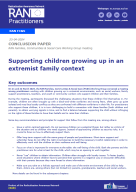Details
- Publication date
- 27 June 2024
- Author
- Directorate-General for Migration and Home Affairs
- RAN Publications Topic
- Family support
Description
On 21 and 22 March 2024, the RAN Families, Communities & Social Care (FC&S) Working Group convened a meeting among practitioners working with children growing up in extremist environments, such as social workers, family support practitioners, teachers, and youth or community workers who support children and their families.
During the meeting, participants discussed the challenging situations that these children find themselves in. For example, children are often brought up with a black-and-white worldview and strong fears, often grow up quite isolated and may face loyalty conflicts as they are confronted with different worldviews in their life. For practitioners who support these children, it is in turn challenging to build a connection with these families (both children and parents), to obtain worrying signals in time, and to find a balance between supporting the child without infringing on the rights of these families to have their beliefs and to raise their children. Some key recommendations and principles for support that follow from this meeting are, among others:
- Have a victim-centred approach. Do not perceive children as a potential threat, but rather as victims of the situation and as children who need support. Instead of approaching children as security risks, it is crucial to focus on how to effectively support them.
- Offer long-term support with the same group of people and practitioners. Short-term support and unfamiliar faces do not offer the right circumstances to build the necessary trustful relationship in order to effectively work with the children on their resilience and well-being.
- Focus on what is important for everyone at the table: the well-being of the child. Both the parents and the practitioner aim for what is best for the child, which may be an opening to work together.
- Never “use” children to obtain information. Children often struggle with loyalty issues. To foster loyalty, avoid situations where children have to perceive their parents in a negative way or encounter difficulties with their parents because they were forced to share information.
- Make sure you take on a holistic approach and make use of the entire environment of the child to help them. Actors are, among others (but not limited to): parents, grandparents, teachers and social workers.
More details can be found in the subsequent chapters.

